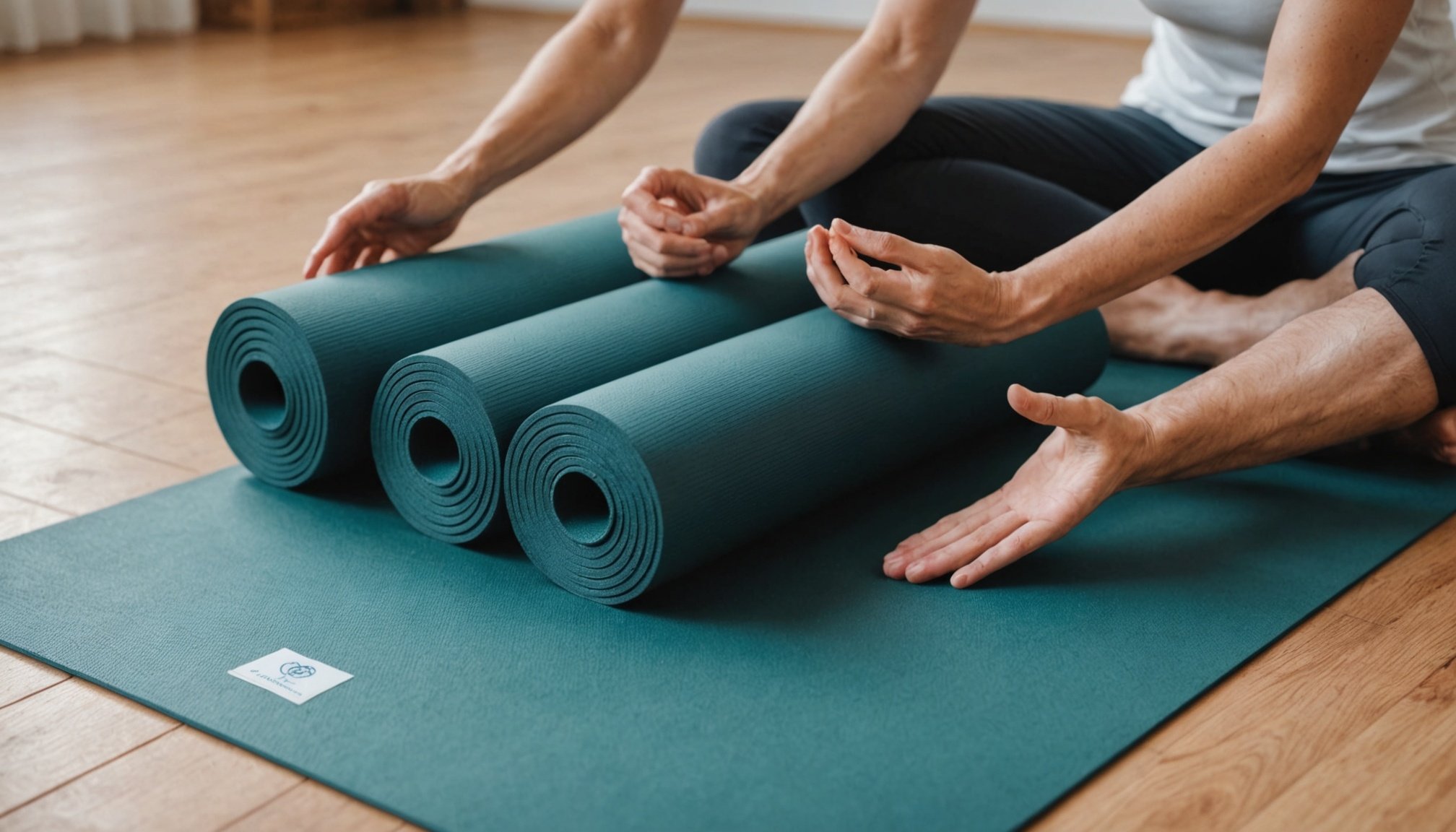Overview of Eco-Conscious Yoga Mats
Eco-conscious yoga mats have become a significant trend among practitioners who value sustainability. These mats are crafted from sustainable materials, making them an ideal choice for those seeking to minimize environmental impact. Unlike traditional yoga mats made from PVC, which can take centuries to decompose, eco-friendly versions use materials such as natural rubber, cork, or recycled TPE.
The importance of using eco-conscious mats lies in their combined environmental and health benefits. For instance, sustainable materials are often non-toxic and biodegradable, lessening the chemical footprint during production and at the end of the product’s lifecycle. This ensures a safer experience for yogis and the planet alike.
Also to read : Discover the Hottest Ethical Fashion Trends for Conscious Shoppers in the UK
What defines a yoga mat as eco-friendly? Primarily the materials: they should be sustainably sourced or recycled. The production process should limit environmental harm, often evidenced by third-party sustainability certifications. Additionally, durability and longevity play a role, as longer-lasting mats reduce the frequency of replacements, minimizing waste.
In choosing an eco-friendly yoga mat, practitioners actively support brands committed to ethical and sustainable practices, aligning their yoga endeavors with broader environmental responsibilities. This not only enhances their personal well-being but also contributes positively to the planet.
Top Eco-Conscious Yoga Mat Brands in the UK
When seeking eco-friendly yoga mats in the UK, it is helpful to start with the criteria that define the best yoga mat brands. These typically include their commitment to using sustainable materials, ethical production processes, and positive user experiences.
Criteria for Selecting Top Brands
Selecting top brands requires consideration of their sustainability practices. This includes evaluating whether they use recycled or natural materials and implement eco-friendly production methods. Brands with recognised sustainability certifications often signal a commitment to these goals.
Leading Eco-Conscious Brands
Several brands stand out in the UK market for their eco-conscious profiles. Companies like [Brand X], which prioritise using natural rubber and cork from sustainable forests, illustrate this commitment. [Brand Y] focuses on recycled TPE materials, offering durability while maintaining low environmental impact.
Brand Comparison Based on Sustainability
When comparing brands, consider factors such as material sources, durability, and user satisfaction. For instance, some brands are praised for their quick decomposability, while others highlight their non-toxic production processes. Pricing varies, offering options for different budgets, ensuring that anyone can engage in eco-conscious shopping with confidence, aligning their purchases with their values.
Benefits of Using Sustainable Yoga Mats
Choosing sustainable yoga mats has numerous advantages, enhancing both personal wellness and environmental responsibility. One of the key benefits is the use of non-toxic materials. Many eco-friendly yoga mats are crafted using natural rubber, recycled TPE, or even cork, which means they do not contain harmful chemicals often found in conventional mats. This results in a healthier practice environment, as yogis are not exposed to potentially hazardous substances during their sessions.
The environmental impact of selecting sustainable products is equally significant. By opting for mats made from biodegradable and recyclable materials, practitioners contribute to reducing landfill waste and pollution. This aligns with the broader goal of lowering one’s ecological footprint and supporting sustainable practices.
Additionally, sustainable mats often enhance the yoga experience, offering unique textures and grip that can improve performance. Materials like cork and natural rubber provide excellent traction and comfort, which can be particularly beneficial for balance and flexibility exercises. With the added assurance of using an eco-conscious product, yogis can focus on their practice with peace of mind, knowing they are making a responsible choice. Ultimately, sustainable yoga mats effectively combine functionality with ethics.
Sustainability Certifications and Practices
Understanding sustainability certifications associated with yoga mats can significantly influence consumer decisions. Certifications such as OEKO-TEX and GOTS provide assurance of ethical sourcing and production processes. For instance, an OEKO-TEX label indicates that a product has been tested for harmful substances, ensuring safety and sustainability. Similarly, the Global Organic Textile Standard (GOTS) ensures that organic fibres meet environmental and social criteria throughout the supply chain.
Ethical sourcing is equally crucial when evaluating eco-friendly practices. This involves using sustainable materials that are responsibly harvested and processed without exploiting workers or the environment. Ethical practices represent a brand’s commitment to maintaining high sustainability standards, offering consumers peace of mind in their purchases.
The presence of these certifications and practices often impacts consumer choice by enhancing trust in the brand’s eco-conscious claims. Many buyers prefer products that demonstrate a transparent commitment to reducing environmental harm. As a result, yoga mat brands with such certifications are often perceived as more reliable, promoting informed, eco-conscious shopping decisions. Understanding these certifications empowers consumers to select products that align with their values, supporting both personal wellness and broader environmental goals.
Tips for Choosing Eco-Friendly Yoga Mats
Choosing the right eco-friendly yoga mat involves considering several key factors to ensure your choice benefits both you and the environment. One primary aspect is understanding the sustainable materials used in mat construction. Materials like natural rubber or cork are often favoured due to their biodegradability and minimal ecological footprint.
When selecting a yoga mat, research the different material types available. For instance, natural rubber offers excellent grip and cushioning, ideal for dynamic practices. Cork, on the other hand, provides a firm surface with natural antimicrobial properties, beneficial for hygiene. It’s crucial to match the material to your practice style and personal preferences.
Additionally, practical considerations should guide your eco-conscious shopping. Look for products with recognisable sustainability certifications, as these assure adherence to ethical and sustainable production standards. Brands with third-party certifications are generally more trustworthy.
Finally, care for your mat extends its lifespan. Regular cleaning helps maintain mat integrity and performance. Eco-friendly cleaning solutions are recommended to avoid introducing harmful chemicals. Proper maintenance ensures that your investment in sustainable choices remains beneficial for both your wallet and the environment in the long term.
Detailed Product Descriptions and Reviews
When considering sustainable yoga mats, understanding product details and user experiences is crucial. In this section, we delve into the specifics of various mats available from leading brands, focusing on product reviews, user feedback, and the unique features that each product offers.
Brand 1: Product Features and Reviews
Brand 1 is lauded for its innovative design and commitment to sustainability. Featuring natural rubber combined with recycled materials, it offers superior grip and durability. Users praise its balance of softness and firmness, which supports a wide range of poses. However, some find it slightly heavier than desired for travel. The price falls within the mid-range, making it accessible to many.
Brand 2: Product Features and Reviews
Brand 2 emphasizes both comfort and sustainability. Its eco-friendly mats are crafted from sustainably sourced cork, known for its natural antimicrobial properties. Users appreciate the mat’s ability to remain odour-free and its excellent grip in hot yoga sessions. The downside, noted by some, is its higher cost, positioning it at the premium end of the market.
Brand 3: Product Features and Reviews
Brand 3 offers a versatile mat, praised for adapting to different yoga practices. Composed of recycled TPE, it’s lightweight and easy to transport, making it ideal for those on-the-go. Reviewers highlight its resilience and eco-conscious design, although some mention a need for additional cushioning. Pricing is competitive, catering to a wide array of budgets.











